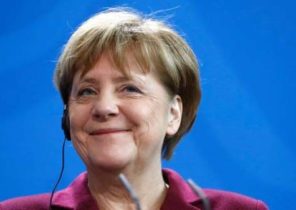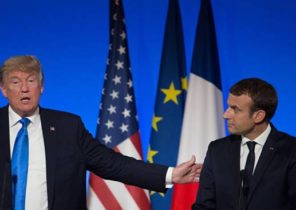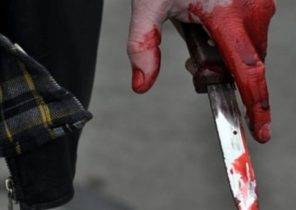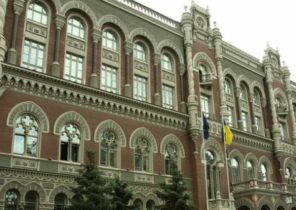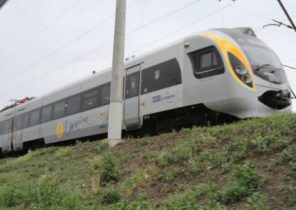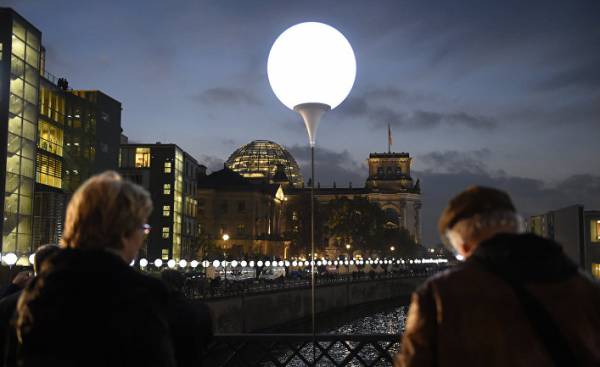
At 9 PM in the theater “Panda” was not available. A poet with a tattoo, a nose piercing and hair, painted a dirty red color, up to the stage. “Rolling mighty Salami. Glorious Russian fields — he recites. — Trains and planes with ships / Perish under the blows Salami”.
Frantic, loud Alexander Dolphin is the uncrowned king of Russian poetry slams in Berlin. His phantasmagoric poems gather huge audience. The audience in the theater “Panda”, which is located in the former brewery in the Berlin district of Prenzlauer Berg, fall into ecstasy.
The performance of the Dolphin becomes the culmination of the evening poetry readings of poets and writers in Berlin. In the hall gathered a lot of owners of sharply defined cheekbones and an extravagant moustache, nestled next to the paintings — a portrait of Tolstoy naked man standing next to the Orthodox Church, a self-portrait with Angela Merkel — written by the artist-emigrant Dmitry Vrubel.
Dolphins and Vrubel are members of a growing community of Russian poets, artists, writers, and intellectuals who turned Berlin into one of the most vibrant centres of Slavic culture, a kind of Moscow-on-the-spree, enormously far from the repressive atmosphere of Putin’s Russia.
The dolphins, who moved to Berlin in 2001, says that in the last five years, when vanished the hopes of the Russians for democratic change, the influx of immigrants increased. Many of them left Russia, in 2012, when Vladimir Putin returned for a third presidential term and decidedly took the right course by starting to impose a new nationalist rhetoric, even tougher to oppress the dissatisfied and annexing the Crimea.
According to official statistics, now in Berlin live 22 thousand Russians expatriates, and in 2015 their number grew by 6%. “These people don’t have seen a future for himself — says the Dolphins. — People from the middle class who just wanted to breathe.”
* * *
Berlin is not the only place where the recent increase in the number of immigrants from Russia. London, new York, tel Aviv and Riga too, can boast of numerous expatriate communities. However, each of these cities attracts their own kind of immigrants. In London go to the oligarchs, their wives and mistresses. Riga, where is the Internet portal “Medusa”, which is harshly critical of the Kremlin, became home to representatives of the Russian free press went to an emergency link. Defenders usually choose Vilnius, capital of Lithuania.
In Berlin coming creative people. Anywhere outside Moscow and St. Petersburg, there are so many Russian artists, musicians, composers and writers, of which there are attracted to low rents and the ambience of alternative culture. “You can swear like a soldier, to worship Satan — all that is impossible in Russia, — says the Dolphins. They have Pushkin, Tolstoy and Dostoevsky, and we have sex, drugs and rock-n-roll.”
The new expatriates different from members of previous waves of immigrants because they don’t want to be stuck in a Russian ghetto, says Georg Witte (Georg Witte), a Slavist from the Free University of Berlin. “They are much more open to the world. Those who are engaged in performing arts, especially young ones, collect much more heterogeneous audience. A feeling that they integrated much better than the previous generation.”
The best proof of this was how the German readers to the work of Russian-language writers-immigrants, some of which have become bestsellers. Among the most famous were the native of Kiev, Katya Petrovskaya, whose debut novel about the Holocaust called “Esther May” in 2013 won the main literary award in Germany. She was one of several young writers from the former Soviet Union, which left a mark in German literature.
But the most famous Russian writer in Berlin is Vladimir Sorokin, whose strange, dystopian novels mocked the repression in Putin’s Russia. Sorokin, whose work in 2013 was the final to receive the Booker prize, is one of the most famous Russian novelists of our time, but in Germany he became a literary celebrity, the epitome of the Moscow-Berlin cultural axis.
Sorokin first arrived in West Berlin in 1988 before the fall of the Berlin wall, when the police with East European shepherd East German was still patrolling the border. He remembers the bright lights of the station “Berlin zoo”, the icon of Mercedes and a huge Billboard on which Busty girl offered cigarettes to the Soviet Colonel: “Try the West taste.”
“That’s what we did,” he laughs. His main recollection is that he was finally left alone. “We lived in a country which constantly sought to grab a piece from us, he says during an interview at his home in Charlottenburg, in the former West Berlin. — And then we were in a country that didn’t have us absolutely nothing”.
Admiration Sorokin Berlin was mutual. He signed his first contract with the publisher in 1988 — it was a huge step forward for a writer whose works had previously been published only in samizdat. The German government showered him with grants, and in 2011, he bought an apartment in Berlin. Since Sorokin half of his time there — the rest of the time he along with his wife holds in the home, which they built in the suburbs.
It turned out that in Berlin, the environment is much calmer than in the Russian capital. In 2002 the Pro-Putin youth organization struck Sorokin for his satirical novel “Blue lard”, where there is a long and explicit sex scene between Stalin and Khrushchev. At the meeting at the Bolshoi theatre activists tore his books and threw them into a giant toilet model. Police brought a case against him on charges of pornography, which was later closed. In 2007 he suffered in a car accident, which he was sure was an attempt on his life.
Currently Sorokin tries to be less likely to appear in Moscow. “Moscow became the center of state power than a real city, it became a place whose inhabitants are forced to perform the role of passive ants,” he says. And he can’t shake the feeling that Russia is close to catastrophe. “It is similar to the Titanic, where the floor is already swinging, furniture are leaving, but people continue to sit at the bar, sipping a Daiquiri”.
* * *
In times of crisis Russian often went to Berlin. The most significant influx of Russian happened in the 1920-ies, when thousands of people fled the Russian revolution and civil war. In 1921-1922 in Berlin arrived 360 thousand refugees from Russia, and most of them are stuck in poverty and homesickness, becoming as he once wrote historian Robert Williams (Robert Williams), a “community of despair.”
However, not all was so bleak. Berlin quickly developed into an important center of Russian culture, where from 1918 to 1924 160 Russian-speaking publishing houses published more books than their Moscow equivalents. As one Russian poet, Berlin became “the stepmother of Russian cities”.
Some of the greatest Russian writers of the 20th century, including Vladimir Nabokov, Maxim Gorky and Boris Pasternak, lived for a time in Berlin. In 1922, at the Unter den Linden in the Gallery van dimena was one of the largest exhibitions of Russian avant-garde art, which presents works by famous modernists such as Kazimir Malevich and Marc Chagall.
Later, many refugees moved on, to Paris and Prague. However, at the end of the cold war in Berlin rushed a new wave of immigrants: according to official statistics, at the end of last year in Berlin lived 130 135 immigrants from the former Soviet Union is 3.5% of the population of the capital.
Among them were many economic refugees, and Soviet Germans returning to their homeland. But after 2000 came to power, Putin and the country made the turn towards authoritarianism, to emigrate and become cultural figures. This wave of emigration hit Dmitry Vrubel. He first came to Berlin in the early 1990-ies, and immediately after his arrival, he created one of the most amazing graffiti on the Berlin wall: it was a portrait of Leonid Brezhnev and Erich Honecker, merged in a passionate kiss, soprovozhdeniya says: “Lord, help me to survive among this mortal love”. (New meme places Brezhnev and Honecker took Putin and Donald trump.) “I liked East Berlin — it was similar to the Soviet Union, only free and without the cops,” says Wrobel.
In 2008, Vrubel with his wife, artist Victoria Timofeeva, moved to Berlin on a permanent basis. They say Berlin is better suited to their areas —large-format street art. Vrubel said that fear of censorship also played a role: he refers to the incident in 2003, when in Moscow, Orthodox activists tore an exhibition of religious subjects. Those vandals who smashed exhibits were not brought to justice, and the organizers were found guilty of inciting hatred on religious grounds and was fined 100 thousand rubles each. “In Russian art of the two topics became tabuirovannykh — politics and religion, says Timofeev. — An artist can’t work under these conditions?”
The 2003 incident was a harbinger of what is expected of artists to come. In 2012, was jailed members of the Pussy Riot group, and then laws were passed banning the promotion of homosexuality and profanity on stage. “After 2012, began a return to traditional values… and this has generated self-censorship in a broad scale, says Russian the avant-garde composer Sergei Nevsky, who lives in two cities — in Moscow and in Berlin. — With the beginning of the war in Ukraine things got even worse.”
Not all immigrants fully broke contact with Russia. Like Nevsky, directed by Kirill Serebrennikov, Director of the theater in Moscow Gogol-center, lives between Russia and Germany. He is a typical representative of recently arrived in Berlin of Russian immigrants from Moscow who bought in a Berlin apartment, but still consider Moscow their main home.
Silver lived in the German capital, while putting “the Barber of Seville” Opera, American Lulu, but he is not planning to stay there permanently: Moscow “too exciting” to get out of. “Now comes the theatrical boom, explains pieces of silver. — People go to plays, discussing them: they are perceived as something valuable and important.” His plays and his time is in great demand: “Like you squeeze the juice 24 hours a day.”
In the interview silver says that concern for creative freedom in Russia is exaggerated. “We’re all alive, we have not started to shoot, and thanks for that,’ he says. And generally, if to quote Fassbinder, fear eats the soul”.
But silver still felt the anger of the Russian crusaders in the name of morality. He read out the complaint to one of the performances of his theatre, “Russian fairy tales”, sent to the Ministry of culture of Moscow. The complaint States that the show “promotes cruelty, violence, murder, incest, bloodshed, and contains a lot of very strong foul language”. “Please find out who’s bankrolling him and who entrusted him to deliver,” wrote the sender of the complaint. But silver shrugs off such interventions. In fact, performances that strike such attacks often use huge scandalous success. “Sometimes this is a deliberate PR strategy: people pay to extremists, to those they attacked,” explains silver.
Sergei Nevsky, as pieces of silver, believes that creative freedom in Russia will survive. According to him, the most difficult period was when Putin annexed the Crimea and in the field of culture was proclaimed the new aggressive policy based on conservative values and belief in superiority of Russia. But he believes that this “Patriotic hysteria” subsided. “They couldn’t find creative people that are truly adapted to this policy,” he says, “so they quietly abandoned”.
It encouraging that, in his opinion, is the new openness of Moscow to the experiments: the audience has enjoyed his work, the art is gradually poured private capital. In February premiere of his Concerto for violin and orchestra Cloud Ground took place at the Perm theatre of Opera and ballet, which, under the direction of Greek conductor Teodor Currentzis (Teodor Currentzis) became one of the vigorous cultural centers of Russia.
Avant-garde singer Natalia Pshenichnikova, who moved to Berlin in 1993, is configured somewhat darker. The economic downturn caused by falling oil prices and Western sanctions, lowered the mood in the creative sector. “The money runs out, the coffers are empty, many people lost their jobs, she says. — The state takes control of all independent bodies, and anyone who criticizes the government, dismiss”. But she is confident that the potential for change is there. “In Russia often there are unexpected turns, she says. — In 1980-e years was so hopeless, we’re just stuck there, not being able to travel, and then perestroika began. To predict the future is impossible.”
Writer Sergei Lebedev, the author of the famous novel “the Limit of oblivion” is also promigrant dreaming of free movement between Moscow, Berlin and other European cities. He notes that in 1910, his great-grandfather lived for a year in Venice after the Bolshevik revolution, these trips have become impossible. “For me, it is extremely important to try to recover this experience of freedom, the feeling that you can just go wherever you intellectual interest,” he says.
Such cosmopolitanism contrasts with the mood in Russia, which under Putin has become much more nationalist, anti-Western and anti-Ukrainian. “No one can imagine that politicians will be able to sow such discord between our two countries and that Ukraine might be our enemy,” said silver, he is half Ukrainian.
But in Berlin the Russian and Ukrainian co-exist peacefully with each other, attend the same festivals, poetry slams and film screenings. “In Berlin we have the Soviet artistic utopia, says Dolphins. — Here all along — Russians, Ukrainians, Kazakhs, and Lithuanians”. Opening a can of beer, decorated with his famous painting “brotherly kiss”, Vrubel agrees with this statement. “Berlin was a kind of perfect, he says. — Be Moscow, where we’d all like to live.”
